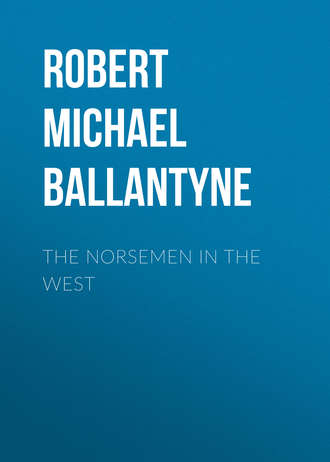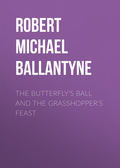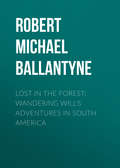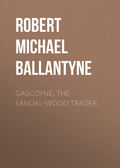
Robert Michael Ballantyne
The Norsemen in the West
“Did these men never boast when they were boys?” asked Olaf; with a troubled air.
Karlsefin relaxed into a smile as he said, “Only when they were very little boys, and very foolish; but they soon came to see how contemptible it is to threaten and not perform; so they gave up threatening, and when performance came to be necessary they found that threats were needless. Now, Olaf, I want you to be a bold, brave man, and I must lull you through the foolish boasting period as quickly as possible, therefore I tell you these things. Think on them, my boy.”
Olaf was evidently much relieved by the concluding remarks. While Karlsefin was speaking he had felt ashamed of himself; because he was filled with admiration of the magnificent skipper, and wanted to stand well in his opinion. It was therefore no small comfort to find that his boasting had been set down to his foolishness, and that there was good reason to hope he might ultimately grow out of it.
But Olaf had much more of the true metal in him than he himself was aware of. Without saying a word about it, he resolved not to wait for the result of this slow process of growth, but to jump, vault, or fly out of the boastful period of life, by hook or by crook, and that without delay. And he succeeded! Not all at once, of course. He had many a slip; but he persevered, and finally got out of it much sooner than would have been the case if he had not taken any trouble to think about the matter, or to try.
Meanwhile, however, he looked somewhat crestfallen. This being observed by the look-out, that worthy was prompted to say— “I’m sure, Olaf; you are welcome to kick me if that will comfort you, but there is no occasion to do so, because I claim not the honour of first seeing the land—and if I had known the state of your mind I would willingly have let you give the hail.”
“You may have been first to discover it at this time, Olaf;” said Biarne, turning round after he had made up his mind about it, “and no doubt you were, since the look-out admits it; nevertheless this is the land that I discovered twenty years ago. But we shall make it out more certainly in an hour or two if this breeze holds.”
The breeze did hold, and soon they were close under the land.
“Now am I quite certain of it,” said Biarne, as he stood on the poop, surrounded by all his friends, who gazed eagerly at the shore, to which they had approached so close that the rocks and bushes were distinctly visible; “that is the very same land which I saw before.”
“What, Vinland?” asked Freydissa.
“Nay, not Vinland. Are you so eager to get at the grapes that ye think the first land we meet is Vinland?”
“A truce to your jesting, Biarne; what land is it?”
“It is the land I saw last when leaving this coast in search of Greenland, so that it seems not unnatural to find it first on coming back to it. Leif; on his voyage, went on shore here. He named it Helloland, which, methinks, was a fitting name, for it is, as you see, a naked land of rocks.”
“Now, then,” said Karlsefin, “lower the sail, heave out the anchor, and let two men cast loose the little boat. Some of us will land and see what we shall see; for it must not be said of us, Biarne, as it was unfairly said of you, that we took no interest in these new regions.”
The little boat was got ready. The Scottish brothers, Hake and Heika, were appointed to row. Karlsefin, Biarne, Thorward, Gudrid, Freydissa, and Olaf embarked and proceeded to the shore.
This land, on which the party soon stood, was not of an inviting aspect. It was sterile, naked, and very rocky, as Biarne had described it, and not a blade of grass was to be seen. There was a range of high snow-capped mountains in the interior, and all the way from the coast up to these mountains the land was covered with snow. In truth, a more forbidding spot could not easily have been found, even in Greenland.
“It seems to me,” said Freydissa, “that your new land is but a sorry place—worse than that we have left. I wonder at your landing here. It is plain that men see with flushed eyes when they look upon their own discoveries. Cold comfort is all we shall get in this place. I counsel that we return on board immediately.”
“You are too hasty, sister,” said Gudrid.
“Oh! of course, always too hasty,” retorted Freydissa sharply.
“And somewhat too bitter,” growled Thorward, with a frown.
Thorward was not an ill-natured man, but his wife’s sharp temper tried him a good deal.
“Your interrupting me before you heard all I had to say proves you to be too hasty, sister,” said Gudrid, with a playful laugh. “I was about to add that it seems we have come here rather early in the spring. Who knows but the land may wear a prettier dress when the mantle of winter is gone? Even Greenland looks green and bright in summer.”
“Not in those places where the snow lies all the summer,” objected Olaf.
“That’s right, Olaf;” said Biarne; “stick up for your sweet aunt. She often takes a stick up for you, lad, and deserves your gratitude.—But come, let’s scatter and survey the land, for, be it good or bad, we must know what it is, and carry with us some report such as Karlsefin may weave into his rhymes.”
“This land would be more suitable for your rhymes, Biarne, than for mine,” said Karlsefin, as they started off together, “because it is most dismal.”
After that the whole party scattered. The three leaders ascended the nearest heights in different directions, and Gudrid with Olaf went searching among the rocks and pools to ascertain what sort of creatures were to be found there, while Freydissa sat down and sulked upon a rock. She soon grew tired of sulking, however, and, looking about her, observed the brothers, who had been left in charge of the boat, standing as if engaged in earnest conversation.
She had not before this paid much attention to these brothers, and was somewhat struck with their appearance, for, as we have said before, they were good specimens of men. Hake, the younger of the two, had close-curling auburn hair, and bright blue eyes. His features were not exactly handsome, but the expression of his countenance was so winning that people were irresistibly attracted by it. The elder brother, Heika, was very like him, but not so attractive in his appearance. Both were fully six feet high, and though thin, as has been said, their limbs were beautifully moulded, and they possessed much greater strength than most people gave them credit for. In aspect, thought, and conversation, they were naturally grave, and very earnest; nevertheless, they could be easily roused to mirth.
Going up to them, Freydissa said— “Ye seem to have earnest talk together.”
“We have,” answered Heika. “Our talk is about home.”
“I am told that your home is in the Scottish land,” said Freydissa.
“It is,” answered Hake, with a kindling eye.
“How come you to be so far from home?” asked Freydissa.
“We were taken prisoners two years ago by vikings from Norway, when visiting our father in a village near the Forth fiord.”
“How did that happen? Come, tell me the story; but, first, who is your father?”
“He is an earl of Scotland,” said Heika.
“Ha! and I suppose ye think a Scottish earl is better than a Norse king?”
Heika smiled as he replied, “I have never thought of making a comparison between them.”
“Well—how were you taken?”
“We were, as I have said, on a visit to our father, who dwelt sometimes in a small village on the shores of the Forth, for the sake of bathing in the sea—for he is sickly. One night, while we slept, a Norse long-ship came to land. Those who should have been watching slumbered. The Norsemen surrounded my father’s house without awaking anyone, and, entering by a window which had not been securely fastened, overpowered Hake and me before we knew where we were. We struggled hard, but what could two unarmed men do among fifty? The noise we made, however, roused the village and prevented the vikings from discovering our father’s room, which was on the upper floor. They had to fight their way back to the ship, and lost many men on the road, but they succeeded in carrying us two on board, bound with cords. They took us over the sea to Norway. There we became slaves to King Olaf Tryggvisson, by whom, as you know, we were sent to Leif Ericsson.”
“No doubt ye think,” said Freydissa, “that if you had not been caught sleeping ye would have given the Norsemen some trouble to secure you.”
They both laughed at this.
“We have had some thoughts of that kind,” said Hake brightly, “but truly we did give them some trouble even as it was.”
“I knew it,” cried the dame rather sharply; “the conceit of you men goes beyond all bounds! Ye always boast of what valiant deeds you would have done if something or other had been in your favour.”
“We made no boast,” replied Heika gravely.
“If you did not speak it, ye thought it, I doubt not.—But, tell me, is your land as good a land as Norway?”
“We love it better,” replied Heika.
“But is it better?” asked Freydissa.
“We would rather dwell in it than in Norway,” said Hake.
“We hope not. But we would prefer to be in our own land,” replied the elder brother, sadly, “for there is no place like home.”
At this point Karlsefin and the rest of the party came back to the shore and put an end to the conversation. Returning on board they drew up the anchor, hoisted sail, and again put out to sea.
Chapter Seven.
Songs and Sagas—Vinland at Last!
In days of old, just as in modern times, tars, when at sea, were wont to assemble on the “fo’c’sle,” or forecastle, and spin yarns—as we have seen—when the weather was fine and their work was done.
One sunny afternoon, on the forecastle of Karlsefin’s ship—which, by the way, was called “The Snake,” and had a snake’s head and neck for a figure-head—there was assembled a group of seamen, among whom were Tyrker the Turk, one of Thorward’s men named Swend, who was very stout and heavy, and one of Karlsefin’s men called Krake, who was a wild jocular man with a peculiar twang in his speech, the result of having been long a prisoner in Ireland. We mention these men particularly, because it was they who took the chief part in conversations and in story-telling. The two Scots were also there, but they were very quiet, and talked little; nevertheless, they were interested and attentive listeners. Olaf was there also, all eyes and ears,—for Olaf drank in stories, and songs, and jests, as the sea-sand drinks water—so said Tyrker; but Krake immediately contradicted him, saying that when the sea-sand was full of water it drank no more, as was plain from the fact that it did not drink up the sea, whereas Olaf went on drinking and was never satisfied.
“Come, sing us a song, Krake,” cried Tyrker, giving the former a slap on the shoulder; “let us hear how the Danish kings were served by the Irish boys.”
“Not I,” said Krake, firmly. “I’ve told ye two stories already. It’s Hake’s turn now to give us a song, or what else he pleases.”
“But you’ll sing it after Hake has sung, won’t you, Krake?” pleaded several of the men.
“I’ll not say ‘No’ to that.”
Hake, who possessed a soft and deep bass voice of very fine quality, at once acceded to the request for a song. Crossing his arms on his chest, and looking, as if in meditation, towards the eastern horizon, he sang, to one of his national airs, “The Land across the Sea.”
The deep pathos of Hake’s voice, more than the words, melted these hardy Norsemen almost to tears, and for a few minutes effectually put to flight the spirit of fun that had prevailed.
“That’s your own composin’, I’ll be bound,” said Krake, “an’ sure it’s not bad. It’s Scotland you mean, no doubt, by the land across the sea. Ah! I’ve heard much of that land. The natives are very fond of it, they say. It must be a fine country. I’ve heard Irishmen, who have been there, say that if it wasn’t for Ireland they’d think it the finest country in the world.”
“No doubt,” answered Hake with a laugh, “and I dare say Swend, there, would think it the finest country in the world after Norway.”
“Ha! Gamle Norge,” (Old Norway) said Swend with enthusiasm, “there is no country like that under the sun.”
“Except Greenland,” said Olaf, stoutly.
“Or Iceland,” observed Biarne, who had joined the group. “Where can you show such mountains—spouting fire, and smoke, and melted stones,—or such boiling fountains, ten feet thick and a hundred feet high, as we have in Iceland?”
“That’s true,” observed Krake, who was an Icelander.
“Oh!” exclaimed Tyrker, with a peculiar twist of his ugly countenance, “Turkey is the land that beats all others completely.”
At this there was a general laugh.
“Why, how can that be?” cried Swend, who was inclined to take up the question rather hotly. “What have you to boast of in Turkey?”
“Eh! What have we not, is the question. What shall I say? Ha! we have grapes there; and we do make such a drink of them—Oh!—”
Here Tyrker screwed his face and figure into what was meant for a condition of ecstasy.
“’Twere well that they had no grapes there, Tyrker,” said Biarne, “for if all be true that Karlsefin tells us of that drink, they would be better without it.”
“I wish I had it!” remarked Tyrker, pathetically.
“Well, it is said that we shall find grapes in Vinland,” observed Swend, “and as we are told there is everything else there that man can desire, our new country will beat all the others put together,—so hurrah for Vinland!”
The cheer was given with right good-will, and then Tyrker reminded Krake of his promise to sing a song. Krake, whose jovial spirits made him always ready for anything, at once struck up to a rattling ditty:—
The Danish Kings
One night when one o’ the Irish Kings
Was sleeping in his bed,
Six Danish Kings—so Sigvat sings—
Came an’ cut off his head.
The Irish boys they heard the noise,
And flocked unto the shore;
They caught the kings, and put out their eyes,
And left them in their gore.
Chorus—Oh! this is the way we served the kings,
An’ spoiled their pleasure, the dirty things,
When they came to harry and flap their wings
Upon the Irish shore-ore,
Upon the Irish shore.
Next year the Danes took terrible pains
To wipe that stain away;
They came with a fleet, their foes to meet,
Across the stormy say.
Each Irish carl great stones did hurl
In such a mighty rain,
The Danes went down, with a horrible stoun,
An’ never came up again!
Oh! this is the way, etcetera.
The men were still laughing and applauding Krake’s song when Olaf, who chanced to look over the bow of the vessel, started up and shouted “Land, ho!” in a shrill voice, that rang through the whole ship.
Instantly, the poop and forecastle were crowded, and there, on the starboard bow, they saw a faint blue line of hills far away on the horizon. Olaf got full credit for having discovered the land first on this occasion; and for some time everything else was forgotten in speculations as to what this new land would turn out to be; but the wind, which had been getting lighter every hour that day, died away almost to a calm, so that, as there was no prospect of reaching the land for some hours, the men gradually fell back to their old places and occupation.
“Now, then, Krake,” said Tyrker, “tell us the story about that king you were talking of the other day; which was it? Harald—”
“Ay, King Harald,” said Krake, “and how he came to get the name of Greyskin. Well, you must know that it’s not many years ago since my father, Sigurd, was a trader between Iceland and Norway. He went to other places too, sometimes—and once to Ireland, on which occasion it was that I was taken prisoner and kept so long in the country, that I became an Irishman. But after escaping and getting home I managed to change back into an Icelander, as ye may see! Well, in my father’s younger days, before I was born—which was a pity! for he needed help sorely at that time, and I would have been just the man to turn myself handy to any sort of work; however, it wasn’t my fault,—in his younger days, my father one summer went over from Iceland to Norway,—his ship loaded till she could hardly float, with skins and peltry, chiefly grey wolves. It’s my opinion that the reason she didn’t go down was that they had packed her so tight there was no room for the water to get in and sink her. Anyway, over the sea she went and got safe to Norway.
“At that time King Harald, one of the sons of Eric, reigned in Norway, after the death of King Hakon the Good. He and my father were great friends, but they had not met for some time; and not since Harald had come to his dignity. My father sailed to Hardanger, intending to dispose of his pelts there if he could. Now, King Harald generally had his seat in Hordaland and Bogaland, and some of his brothers were usually with him; but it chanced that year that they went to Hardanger, so my father and the king met, and had great doings, drinking beer and talking about old times when they were boys together.
“My father then went to the place where the greatest number of people were met in the fiord, but nobody would buy any of his skins. He couldn’t understand this at all, and was very much annoyed at it, and at night when he was at supper with the king he tells him about it. The king was in a funny humour that night. He had dashed his beard with beer to a great extent, and laughed heartily sometimes without my father being able to see what was the joke. But my father was a knowing man. He knew well enough that people are sometimes given to hearty laughter without troubling themselves much about the joke—especially when they are beery,—so he laughed too, out of friendliness, and was very sociable.
“When my father went away the king promised to pay him a visit on board of his ship next day, which he did, sure enough; and my father took care to let it be known that he was coming, so there was no lack of the principal people thereabouts. They had all come down together, by the merest chance, to the place where the ship lay, just to enjoy the fresh air—being fresher there that day than at most other places on the fiord, no doubt!
“King Harald came with a fully-manned boat, and a number of followers. He was very condescending and full of fun, as he had been the night before. When he was going away he looked at the skins, and said to my father, ‘Wilt thou give me a present of one of these wolf-skins?’
“‘Willingly,’ says my father, ‘and as many more as you please.’
“On this, the king wrapped himself up in a wolf-skin and went back to his boat and rowed away. Immediately after, all the boats in his suite came alongside and looked at the wolf-skins with great admiration, and every man bought just such another wolf-skin as the king had got. In a few days so many people came to buy skins, that not half of them could be served with what they wanted, and the upshot was that my father’s vessel was cleared out down to the keel, and thereafter the king went, as you know, by the name of Harald Greyskin.
“But here we are, comrades,” continued Krake, rising, “drawing near to the land,—I’ll have a look at it.”
The country off which they soon cast anchor was flat and overgrown with wood; and the strand far around consisted of white sand, and was very low towards the sea. Biarne said that it was the country to which Leif had given the name of Markland, because it was well-wooded; they therefore went ashore in the small boat, but finding nothing in particular to attract their interest, they soon returned on board and again put to sea with an onshore wind from the north-east. (Some antiquaries appear to be of opinion that Helloland must have been Newfoundland, and Markland some part of Nova Scotia.)
For two days they continued their voyage with the same wind, and then made land for the third time and found it to be an island. It was blowing hard at the time, and Biarne advised that they should take shelter there and wait for good weather. This they did, and, as before, a few of them landed to explore the country, but there was not much to take note of. Little Olaf, who was one of the explorers, observed dew on the grass, and, remembering that Leif had said that the dew on one of the islands which he met with was sweet, he shook some into the hollow of his hand and tasted it, but looked disappointed.
“Are you thirsty, Olaf?” asked Karlsefin, who, with Biarne, walked beside him.
“No, but I wondered if the dew would be sweet. My father said it was, on one of the islands he came to.”
“Foolish boy,” said Biarne, laughing; “Leif did but speak in a figure. He was very hot and tired at the time, and found the dew sweet to his thirsty spirit as well as refreshing to his tongue.”
“Thus you see, Olaf,” observed Karlsefin, with a sly look at Biarne, “whenever you chance to observe your father getting angry, and hear him say that his beer is sour, you are not to suppose that it is really sour, but must understand that it is only sour to his cross spirit as well as disagreeable to his tongue.”
Olaf received this with a loud laugh, for, though he was puzzled for a moment by Biarne’s explanation, he saw through the jest at once.
“Well, Biarne,” returned Olaf; “whether the dew was sweet to my father’s tongue or to his spirit I cannot tell, but I remember that when he told us about the sweet dew, he said it was near to the island where he found it that the country he called Vinland lay. So, if this be the sweet-dew island, Vinland cannot be far off.”
“The boy is sharp beyond his years,” said Karlsefin, stopping abruptly and looking at Biarne; “what thinkest thou of that?”
“I think,” replied the other, “that Olaf will be a great discoverer some day, for it seems to me not unlikely that he may be right.”
“Come, we shall soon see,” said Karlsefin, turning round and hastening back to the boat.
Biarne either had not seen this particular spot on his former visit to these shores, which is quite probable, or he may have forgotten it, for he did not recognise it as he had done the first land they made; but before they left Ericsfiord, Leif had given them a very minute and careful description of the appearance of the coast of Vinland, especially of that part of it where he had made good his landing and set up his booths, so that the explorers might be in a position to judge correctly when they should approach it. Nevertheless, as every one knows, regions, even when well defined, may wear very different aspects when seen by different people, for the first time, from different points of view. So it was on this occasion. The voyagers had hit the island a short distance further south than the spot where Leif came upon it, and did not recognise it in the least. Indeed they had begun to doubt whether it really was an island at all. But now that Olaf had awakened their suspicions, they hastened eagerly on board the “Snake,” and sailed round the coast until they came into a sound which lay between the Island and a cape that jutted out northward from the land.
“’Tis Vinland!” cried Biarne in an excited tone.
“Don’t be too sure of that,” said Thorward, as a sudden burst of sunshine lit up land and sea.
“I cannot be too sure,” cried Biarne, pointing to the land. “See, there is the ness that Leif spoke of going out northwards from the land; there is the island; here, between it and the ness, is the sound, and yonder, doubtless, is the mouth of the river which comes out of the lake where the son of Eric built his booths. Ho! Vinland! hurrah!” he shouted, enthusiastically waving his cap above his head.
The men were not slow to echo his cheer, and they gave it forth not a whit less heartily.
“’Tis a noble land to look upon,” said Gudrid, who with the other females of the party had been for some time gazing silently and wistfully towards it.
“Perchance it may be a great land some day,” observed Karlsefin.
“Who knows?” murmured Thorward in a contemplative tone.
“Ay, who knows?” echoed Biarne; “time and luck can work wonders.”
“God’s blessing can work wonders,” said Karlsefin, impressively; “may He grant it to us while we sojourn here!”
With that he gave orders to prepare to let go the anchor, but the sound, over which they were gliding slowly before a light wind, was very shallow, and he had scarcely ceased speaking when the ship struck with considerable violence, and remained fast upon the sand.







